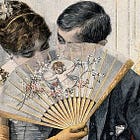Haven’t read the first chapter yet? You can find it here:
It tells the story of a love correspondence from 1899: ten messages published in a local newspaper addressed to “Amor Bianco.”
This is the second chapter: an attempt to understand who the man behind the words might have been.
The lengthy message for Amor Bianco on June 21, 1899, tells us something important about its author.
The ads published by Haasenstein and Vogler cost 5 cents per word, and this specific ad consists of 397 words. That makes 19.85 lire of the time.
With the help of technology, I discovered that, in 1899, in Italy, 20 lire corresponded to almost a laborer's weekly wages!
Not a message, then, but an emotional investment.
Who was this man who could spend so much money to say "I love you" through a German advertising agency?
His messages reveal neither name nor profession.
Starting from this intriguing detail, I tried to gather as many clues as possible about him from his messages. Again with the help of technology, I set out to reconstruct a potential profile of this impetuous, clandestine lover.
Who he was NOT
He was not young.
The careful syntax, the measured self-reflection, the way he analyzes his own emotions belong to a man with experience. When he writes:
I am remorseful for not having been more energetic, then
he speaks like someone who has lived long enough to understand his own patterns.
He was not poor.
Beyond the obvious expense of the ads, there are other signs: he travels to Bologna by train (and buys tickets for her), and he speaks of Rome as a destination he could reach "without fail" if he chose to. Money is a tool for him, not an aspiration.
He was not a seducer.
His messages don't seek to impress: they want to communicate. He doesn't promise, doesn't flatter. When he writes:
I don't want to demand impossible things
he reveals someone who respects boundaries even when he desires to cross them.
He was not reckless.
Even in the outpouring of June 21, he stops himself:
How much more I would say and write, if it were not for the instinctive repugnance of making public what constitutes the most intense and beautiful elevation of our souls!
The geography of a heart
His messages chart an exact emotional geography.
She is in Rome, while he seems to be in Florence. They meet in Bologna, a midpoint reached by train, planned with care.
Venice is just the neutral printing point, perhaps chosen for its distance from their real lives. The Gazzetta di Venezia becomes their secret post office, where neither of them lives, but both can be found.
This geographical precision reveals a methodical mind. He is someone who thinks in terms of logistics and understands that a secret love requires infrastructure.
The body as barometer
Perhaps the most revealing trait of his character is how he transforms love into physical symptoms.
I cannot hide from you that my health leaves much to be desired
he writes on June 28.
My mood then is unfortunately terrible. Your distance greatly affects me.
This is not rhetoric: distance from his beloved is a medical matter for him. The body reacts to absence like an illness. Waiting wears him down, and separation weakens him.
Your punctuality means health to me
he writes in another message. Love, for him, is measured in terms of physical well-being.
When he feels unwell, he says so with clinical precision. He is not a romantic who plays with suffering: he is a man who records the concrete effects of passion on his own organism.
Writing to be remembered
Something is interesting about his relationship with censorship. On June 17, Haasenstein & Vogler refuses to publish his message:
Be a little calmer in expressing yourselves and then we will publish.
His reaction?
This little fact put me in a good mood Saturday because I thought that if it were known... and we understand each other, don't we?
He is amused like a boy caught in the act who finds the idea of risk exciting.
This reveals a key aspect of his character: he doesn't write to get something, he writes to be remembered. His June correspondence has no practical objectives - its purpose is existential: to remain alive in the other's mind when the body is distant.
That's why he spends without calculating and transforms the newspaper into an intimate space. That's why he even accepts the impersonal mediation of a German agency: as long as his words reach their destination.
The arithmetic of longing
Perhaps the most revealing detail is his relationship with numbers. He keeps track of everything: the cost of ads, the dates of letters, the exact times of train departures.
Today is the 20th; do you remember where we were returning from months ago?
Even Haasenstein and Vogler becomes part of his emotional accounting: love, mediated by German efficiency and Italian currency.
When the agency censors him on June 17 he responds not angrily, but with analysis. He understands that even passion must operate within systems.
The last message we have from him is dated August 24
Usual time.
By then, the newspaper has served its purpose. It has brought him and Amor Bianco together enough that words are no longer necessary.
The economy of appointment-setting has replaced the expensive declarations of June.
Perhaps this is how love succeeds: when you no longer need to buy space in newspapers to prove it exists.
The man behind "Amor Bianco" remains nameless, but his portrait comes through clearly in the arithmetic of longing: exact, expensive, and completely human.





What a great read, thanks, HM!